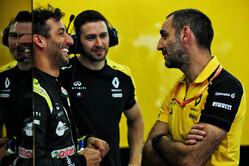


17/10/2019
NEWS STORY
 In the wake of the legal action which saw Daniel Ricciardo being sued by his former agent, there are fears that other drivers could find themselves subject to similar claims.
In the wake of the legal action which saw Daniel Ricciardo being sued by his former agent, there are fears that other drivers could find themselves subject to similar claims.
The Australian was taken to court in London by his former agent, Glenn Beavis, whose company, Sivana Sports International, had provided management and consultancy services to the driver since 2012.
Ricciardo ended his dealings with Beavis and Sivana in December last year, subsequently signing up to CAA Sports, the Los Angeles-based talent and sports agency whose clients include numerous household names from the worlds of sport, music and movies.
In his action, Beavis claimed that the year before the split with Ricciardo he had kick-started talks with Renault with a view to signing the Australian, and as a result Sivana was entitled to a share of the proceeds under the terms of its contract with the driver.
According to the lawsuit, after winning three races in his debut season with Red Bull, the terms of Ricciardo's management agreement were revised, with Sivana to receive $20,000 a month plus 20% commission on all new deals introduced by Beavis and agreed by Ricciardo or his marketing company Whitedunes.
However, Ricciardo denied Beavis' claim, and said that the idea of switching to Renault was actually his father's.
The Australian said he had no obligation to pay Sivana a 20% commission on the value of new deals and that even if he did, they would only be "contracts relating to sponsorship or merchandising. They did not relate to Mr. Ricciardo's racing earnings".
Before the case came to trial however, it was settled, Ricciardo announcing in a statement that the pair had "reached an amicable settlement over the amounts due." He added "up until now it didn't really weigh on me but if it continued and had gone another year or two down the track, then for sure it would have eventually been something I didn't need.
"Even if sometimes you think something's not distracting you, it could be," he added, "so I'm happier to put it behind me. It's not something we wanted. It wasn't comfortable, I guess. I think [we are] both relieved."
Widely regarded as one of the most shrewd and aware drivers on the F1 grid, experts admit surprise that his management contract didn't appear to make it clear whether or not his racing earnings could be classed as a new deal.
Indeed, the action has fuelled suggestions that those drivers not as savvy as Ricciardo, would well find themselves with contracts exposing them to similar claims.
According to Forbes, Charles Braithwaite, a partner at law firm Collyer Bristow, says it is highly likely "that many other drivers, and their managers and agents, will now be looking again at their contracts to ensure they are clear and up to date, and accurately reflect the wishes of the parties".
He adds that future cases "would depend on how the other contracts were worded. Drivers (or managers/agents) who had clearly worded contracts would likely have no cause for dispute. If there is ambiguity, a party could inevitably try to influence that ambiguity to his/her advantage."
Talking before the settlement, Jonathan Lux, founder of Lux-Mediation, said that if Beavis came out in the lead "it could expose any other drivers with similarly worded contracts to Court claims for commission on their racing earnings, as opposed to simply their earnings from marketing activities. This dispute certainly highlights the importance of clear wording in contracts. Also, it can hardly be the wish of either party to wash its dirty linen in public and be exposed to the full glare of publicity.
Indeed, the particulars of claim made fascinating reading, revealing that other than a "fixed fee" of $55m for his two years at Renault, Ricciardo would receive a Renault road car for personal use, with the costs of insurance, road tax and maintenance to be borne by Renault, estimated to be worth $30,000, and the payment of the cost of a physiotherapist and medical expenses up to an amount of £100,000 for the 2019 season.
It is surely preferable, says Lux, "to refer the dispute to mediation which is private and confidential, offers huge savings in terms of speed of resolution and cost and also opens up the possibility of creative and innovative solutions which no Judge would have the power to order. Lux-Mediation has expertise in the field of motorsport mediation and may therefore be in pole position for the resolution of such disputes."
"The other 'lesson' from this claim is the danger of discussing payment terms (particularly if either party may rely on them) without confirming the same by signed written agreement," adds Braithwaite. "Indeed, if there is an existing agreement, it may be a requirement that any variation to that agreement shall only be valid if in writing and signed by both parties. For clarity and certainty for both parties, and to help avoid disputes, parties would do well to remember this."